|
|
|
Sort Order |
|
|
|
Items / Page
|
|
|
|
|
|
|
| Srl | Item |
| 1 |
ID:
156257
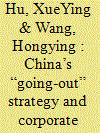

|
|
|
|
|
| Summary/Abstract |
China’s rapidly growing outbound foreign direct investment (OFDI) has attracted a great deal of concern about its impact on the recipient countries. But so far there has been little research on what effect the “going-out” strategy has had on China itself. This is an important question to study because the answer to it will shed light on what kind of an international actor China is becoming as it becomes further integrated with the global economy and what outside influence there can be on China’s domestic governance reform. This article explores the effect of investing overseas on Chinese companies in the area of corporate social responsibility (CSR). Through an analysis of an original sample of data, the authors find preliminary evidence of a positive impact of OFDI on Chinese companies’ commitment to CSR. More research will be needed to uncover the mechanisms and limitations of this apparent trend toward institutional convergence.
|
|
|
|
|
|
|
|
|
|
|
|
|
|
|
|
| 2 |
ID:
103979
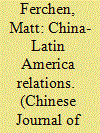

|
|
|
| 3 |
ID:
161805
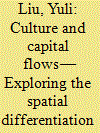

|
|
|
|
|
| Summary/Abstract |
Using a panel data of China's OFDI over the period of 2003–2013, this study investigates how cultural distance and its dimensions explain China's OFDI spatial differentiation. We find that cultural distance has a curvilinear (U-shaped) relationship with China's OFDI. The growth rates of “liability of foreignness (LOF)” and “advantages of foreignness” (AOF) finally determine whether cultural distance cause conflicts or improve innovation. In addition, we find that how China's OFDI activities are related to the difference of cultural distance hinges on the particular cultural dimension in question. The latter suggests that that the relative weight of cultural dimensions should be considered in the calculation of cultural distance. Overall, this study makes important contributions to both theory and practice. Our findings offer important insights into OFDI activities and provide guidelines for managers about entry strategies.
|
|
|
|
|
|
|
|
|
|
|
|
|
|
|
|
| 4 |
ID:
167884
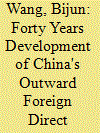

|
|
|
|
|
| Summary/Abstract |
Outward foreign direct investment (OFDI) has increasingly become an important method for China to integrate into the world economy. This paper comprehensively reviews and analyzes policy development and the changing pattern of China's OFDI over the past 40 years. We divide the development into “restricted” (1978–1999), “relaxed” (2000–2016) and “regulated” (2017 onwards) stages. This paper also reviews literature on the impact of Chinese OFDI on China and host countries. Despite its generally positive effects, large‐scale and unbalanced OFDI activities have alarmed Chinese policymakers. Both developing and developed host countries have expressed their concern over national security and the misbehavior of some Chinese overseas enterprises. Therefore, greater supervision and adjustment from quantity to quality growth is necessary for the future development of China's OFDI.
|
|
|
|
|
|
|
|
|
|
|
|
|
|
|
|
| 5 |
ID:
181472
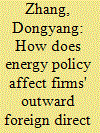

|
|
|
|
|
| Summary/Abstract |
Energy policy can improve the efficiency of firms' outward foreign direct investment (OFDI) and promote the quality of China's economic growth, which is an important issue requiring urgent attention from Chinese society. Using the data of A-share listed companies from 2007 to 2018, this paper examines the impacts and mechanisms of both new and traditional energy policies on firms' OFDI. First, this study found a significant positive promotion effect from energy policy on firms' OFDI. Second, the heterogeneity test results suggest that an increase in the level of urban openness may weaken the positive effect of new energy policies on firms' OFDI, but may enhance the promotion effect of traditional energy policies. State ownership is conducive to enhancing firms' OFDI under new energy policies. However, such ownership can weaken the willingness of firms to invest abroad under traditional energy policies. Third, the mechanism analysis shows that new energy policy promotes firms to invest in technologically developed host countries, thus expanding the scale of firms' OFDI in the next round. Energy policies can improve firms' business and environmental performances in the short run; in the long run, this effect diminishes year by year.
|
|
|
|
|
|
|
|
|
|
|
|
|
|
|
|
| 6 |
ID:
172561
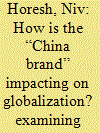

|
|
|
|
|
| Summary/Abstract |
This article is aimed at better understanding China's Overseas Foreign Direct Investment (OFDI) choices through a post-War Japanese historical perspective. It will focus in the main on OFDI as a marker of an advanced stage of the East Asian ‘developmental state’ formula, wherein the ‘China Brand’ takes shape. The transition process from heavy-industry and low-value added goods to frontier-technology manufacturing with global brand recognition will be placed under scrutiny. A Japanese perspective is called for, as much of the theory in the field of international business to do with OFDI and the growth of multinational corporations (MNCs) is currently primarily derived from a Western developed-economy setting, and hence does not seek to offer much in the way of predictive insight about all-important yet middle-income China, as it proceeds towards becoming the largest economy on the planet. The article surveys the historical trajectory of Chinese OFDI, underling its correlation with inbound foreign investment into China; it then offers a comparative view of Japanese OFDI in the pre- and post-War era. It then assesses Chinese brand strength in the electrical appliance, automobile, and IT areas. Finally, it offers a prognosis as to the future direction of Chinese OFDI, and how it might affect the contours of globalization as well as Sino-American rivalries.
|
|
|
|
|
|
|
|
|
|
|
|
|
|
|
|
| 7 |
ID:
191154
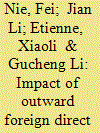

|
|
|
|
|
| Summary/Abstract |
This study examines the impact of outward foreign direct investment (OFDI) on Chinese manufacturing firms' financialization and servitization. Using a difference-in-differences approach with propensity score matching, we found that OFDI encouraged firms' financial and service activities. The effects of OFDI on financialization were stronger for firms specializing in short-term financial assets, operating in labor and technology-intensive sectors, investing overseas to pursue production, resources and markets there, and investing in non-OECD and Belt and Road Initiative (BRI) countries. Meanwhile, firms investing overseas were more likely to provide services at the sale or postsale stages. Outward foreign direct investment has also boosted the service activities of firms operating in the technology-intensive sector by investing overseas to seek resources and markets, as well as investing in non-OECD and BRI countries. Finally, OFDI partially influenced the extent of financialization and servitization of firms by affecting their profit-making ability.
|
|
|
|
|
|
|
|
|
|
|
|
|
|
|
|
| 8 |
ID:
156442
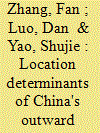

|
|
|
|
|
| Summary/Abstract |
Compared to inward foreign direct investment, outward foreign direct investment (OFDI) from China is a relatively new phenomenon. However, the volume of China's OFDI increased rapidly from 2004. There has been an increasing amount of literature on the motivations of China's OFDI, but few studies have focused on its location determinants. The present paper aims to fill this gap in the literature by focusing on two important location factors, natural resources and technology, which are the most important determinants of China's OFDI. We use a large panel dataset comprising 132 countries over the period 1991–2009 and the Tobit as well as the Heckman models to establish the relationship between the two location factors and China's OFDI. The empirical results suggest that although China's OFDI has been driven by the country's desire for a secure supply of natural resources and to attain advanced technology from the developed world, China's technology is also a critical attraction for the host developing economies.
|
|
|
|
|
|
|
|
|
|
|
|
|
|
|
|
| 9 |
ID:
142030
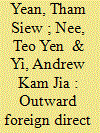

|
|
|
|
|
| Summary/Abstract |
The overall pattern of outward foreign direct investment from Malaysia indicates increasing participation in global outflows of foreign direct investment, especially to Southeast Asia. In 1980, Malaysia was ranked eleventh in the top fifteen developing and transition economies in terms of stocks of outward foreign direct investment, but it moved up to the tenth position by 2013. Outward flows surpassed inward flows after 2007 and Malaysia became a net capital exporter. This paper seeks to examine the pattern of outward foreign direct investment from the country, key motivations, and some of its impact. Government-linked companies are key players in these outward flows, especially in the oil and gas and services sector. The main findings in this paper show that outward investment from Malaysia is driven mainly by a horizontal, market-seeking type of investment while the literature indicates that its impact on trade is insignificant. Given the key role played by government-linked companies in outward foreign direct investment, an important return from these investments will be the repatriation of profits back to the home country. To promote greater transparency, these companies need to report to the public the returns and repatriation of profits on their investments abroad for Malaysia’s current and future development.
|
|
|
|
|
|
|
|
|
|
|
|
|
|
|
|
| 10 |
ID:
190159
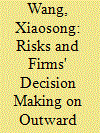

|
|
|
|
|
| Summary/Abstract |
This study explored how the risks encountered by Chinese state-owned enterprises (SOEs) affected their decision-making on outward foreign direct investment (OFDI), using data regarding the relationship between the host countries and China. The following conclusions were drawn. Larger SOEs with fixed capital exhibited a higher probability of conducting OFDI and did so on a larger scale. Various risks in host countries significantly hindered the OFDI of Chinese SOEs. In pursuit of natural resources, Chinese SOEs chose to take risks. The amount of OFDI by SOEs was positively related to the political, economic, and geographical relations between China and the corresponding host country.
|
|
|
|
|
|
|
|
|
|
|
|
|
|
|
|
| 11 |
ID:
086206


|
|
|
|
|
| Publication |
2009.
|
| Summary/Abstract |
An important new issue on the international scene is the upsurge in market and non-market South-South relations. The aim of this paper is to understand the dynamics that lie behind the recent Chinese move into Africa by empirically exploring the determinants of Sino-African relationships. In order to have a comprehensive picture, the analysis takes into consideration the main channels of commercial and political interactions: outward foreign direct investment (OFDI), trade and aid (international economic cooperation). The empirical analysis utilises a panel data set, from 1998 to 2005, for 43 African countries. The econometric estimates for three simultaneous equations are based on an instrumental variables method. Results show that the Chinese move into Africa is driven by strategic interaction among the three channels (FDI, trade and economic cooperation) as well as by pull factors, i.e. the characteristics of the receiving countries in terms of natural resource endowments and their market potential.
|
|
|
|
|
|
|
|
|
|
|
|
|
|
|
|
| 12 |
ID:
193005
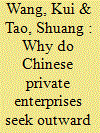

|
|
|
|
|
| Summary/Abstract |
China is currently in a period of economic transformation and the reform of the factor market still lags behind that of the product market. This study explores the reasons causing China's private enterprise to expand abroad from the perspective of domestic factor market imperfection. Using data for Chinese listed firms between 2002 and 2020, it examines whether outward foreign direct investment (OFDI) has been undertaken by private enterprises as a response to domestic factor market imperfection. It finds that private enterprises located in regions with greater factor market imperfection have had a greater tendency to engage in OFDI. This effect has been more pronounced among firms with high productivity or high innovation capability, and among medium and small private enterprises.
|
|
|
|
|
|
|
|
|
|
|
|
|
|
|
|
|
|
|
|
|